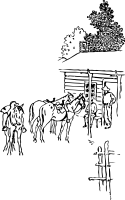Associations to the word «Stable»
Noun
- Barn
- Corral
- Loft
- Horse
- Stall
- Isotope
- Sumo
- Newmarket
- Shed
- Url
- Pony
- Stable
- Groom
- Stallion
- Manure
- Steed
- Inn
- Coachman
- Thoroughbred
- Courtyard
- Barracks
- Blacksmith
- Jockey
- Mule
- Carriage
- Filly
- Pasture
- Wrestler
- Cow
- Bridle
- Racehorse
- Saddle
- Trainer
- Mare
- Equilibrium
- Yard
- Wagon
- Decay
- Flair
- Stability
- Epsom
- Siding
- Saloon
- Outlook
- Polymerase
- Complex
- Depot
- Suffolk
- Heel
- Wrestling
- Kennel
- Locomotive
- Fitch
- Roof
- Conformation
- Nuremberg
- Nave
- Perturbation
- Straw
- Neutron
- Hay
- Hydrolysis
- Heracles
- Train
- Oscillator
- Anion
- Racetrack
- Proton
- Oxidation
Adjective
Pictures for the word «Stable»
Wiktionary
STABLE, noun. A building, wing or dependency set apart and adapted for lodging and feeding (and training) animals with hoofs, especially horses.
STABLE, noun. (metonymy) All the racehorses of a particular stable, i.e. belonging to a given owner.
STABLE, verb. (transitive) to put or keep (horse) in a stable.
STABLE, verb. (rail transport) (transitive) to park (a rail vehicle)
STABLE, adjective. Relatively unchanging, permanent; firmly fixed or established; consistent; not easily moved, altered, or destroyed.
STABLE BOY, noun. A boy or young man who attends in a stable.
STABLE BOYS, noun. Plural of stable boy
STABLE FLIES, noun. Plural of stable fly
STABLE FLY, noun. Any of several medium-sized flies in the genus Stomoxys, of the family Muscidae that includes the housefly. The genus is unusual among members of that family, in that they suck blood from mammals.
STABLE FLY, noun. Stomoxys calcitrans.
STABLE GIRL, noun. A girl or young woman who attends in a stable.
STABLE OF BITCHES, noun. (colloquial) A group of loose women or prostitutes.
Dictionary definition
STABLE, noun. A farm building for housing horses or other livestock.
STABLE, verb. Shelter in a stable; "stable horses".
STABLE, adjective. Resistant to change of position or condition; "a stable ladder"; "a stable peace"; "a stable relationship"; "stable prices".
STABLE, adjective. Firm and dependable; subject to little fluctuation; "the economy is stable".
STABLE, adjective. Not taking part readily in chemical change.
STABLE, adjective. Maintaining equilibrium.
STABLE, adjective. Showing little if any change; "a static population".
Wise words
One merit of poetry few persons will deny: it says more and
in fewer words than prose.

